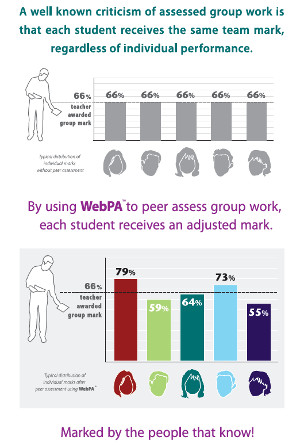
December 17, 2014, by Teaching at Nottingham
WebPA: Peer-Assessed Group Work in the Faculty of Engineering
- WebPA is an online, automated tool that facilitates peer-moderated marking of group work
- Students mark their fellow group members’ performance and this mark is combined with the teacher’s mark to give an overall score
- WebPA helps avoid the problems associated with imbalanced contributions to group work, making the process more fair
Sean Moran, Faculty of Engineering: “Historically, in Engineering, there’s been a great deal of student dissatisfaction with the allocation of individual marks for group projects; there have been problems with free-riding and all the other usual problems with group work. We weren’t the only academics in this situation – the Higher Education Academy recognised these problems and responded by developing an online tool called WebPA. It’s free, open-source and, although it’s an Engineering tool, lots of people use it for other things.
“WebPA allows students to assess and comment on each other’s contributions within a group work project; when combined with the assessor’s mark for the project, these ratings can be used to produce marks which vary between group members according to their level of contribution. Using WebPA we can ask students questions about the people they’re working with, such as ‘To what extent did the person make sure to include all group members?’ or ‘To what extent did they operate effectively as a leader?’ I want to make sure that people don’t get away with doing nothing; for example, in the same group you might have a very hard-working student and one student who doesn’t turn up. The top mark received by one of the group members could be 96%, but the person who didn’t turn up could get 17.5% based on the ratings of his/her peers.
“The students can access WebPA through a link on Moodle. I start by allocating their groups and using WebPA as a tool for them to find their fellow group members, just to get them used to it. Nobody has been unable to use it; I’ve had several hundred students use it and nobody has come back to me saying ‘I don’t understand it’…The next time they encounter WebPA will be on a real piece of coursework. I’ve got a number of forms, with different assessment criteria. Once the form is set up you can import it and use it with any group of students. The first form is quite basic and not very in-depth; quite often you find that in the first assessment of group work the students are getting along quite nicely, but as the pressure ramps up a bit things may start to crack. I have an in-depth form, so when I see that there are problems I can ask a lot more questions. They fill in these forms three times over the course of the module…Students are able to ascribe marks to their fellow group members, as well as giving extended feedback – the combination of these things means there’s essentially no place to hide…When you use weaker peer assessment, people are able to skate through. With WebPA that behaviour would be a straight fail.
“The beauty of WebPA is that it can take less than a minute to set up a new assessment and less than a minute to put the group marks in… WebPA plus your group mark represents your final grade – for a group mark where you had a 65, the combination with WebPA could easily push it up to an 80, for example… You can decide how strongly you want to apply it. To put the marks onto the University’s systems, all our administrative team has to do is run everything through this programme and it imports everything directly into the portal where the students’ marks go up.
“It’s a well-developed programme, although there are a few small difficulties. For example, it doesn’t come with forms – you have to create your own. Also, we’ve found that some groups of students have a tendency to over-rate their fellow group members and I’ve had students on the autistic spectrum who haven’t wanted to disclose their condition, [but whose marks for group work are reflecting it]. Where marks look dodgy you can strike them out…I reserve the right to moderate.
“WebPA encourages people to recognise that there’s more to a group than being a leader – teamwork is rewarded. Engineering is a collaborative activity; I’m not prepared to give a student 100% for going off on their own and ignoring their group. It’s also important to get students used to assessing themselves – the development of professional competence involves accurate self-assessment…WebPA is sophisticated and robust and, as of this year, it’s been rolled out as our department’s standard peer assessment tool – we use it for all group peer assessment now.”
Links:
No comments yet, fill out a comment to be the first

Leave a Reply